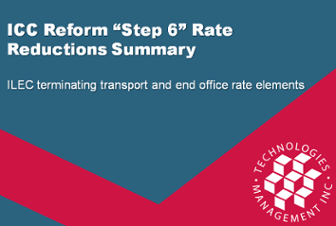 Today: Deployment of Broadband in Multiple Tenant Buildings, Elimination of Payphone Compensation Audit Requirements, Rules to address threatening calls, FCC Process For Reviewing FirstNet Opt-out Plans
Today: Deployment of Broadband in Multiple Tenant Buildings, Elimination of Payphone Compensation Audit Requirements, Rules to address threatening calls, FCC Process For Reviewing FirstNet Opt-out Plans
FCC Considers Ways To Accelerate Deployment Of Broadband In Multiple Tenant Buildings
At is June 22, 2017 Open Meeting, the FCC voted to issue a Notice of Inquiry seeking comment on ways to increase deployment, competition and innovation in the market for broadband in apartments, shopping malls and other multiple tenant environments (MTEs). The Notice seeks comment on a number of issues, including:
- The current state of broadband competition in MTEs.
- Whether there are state and local regulations that inhibit or have the effect of inhibiting broadband deployment and competition within MTEs, such as by preventing market entry or mandating infrastructure sharing by private companies.
- Whether the FCC should take any action regarding service providers’ exclusive marketing and bulk billing arrangements within MTEs.
- How revenue sharing agreements and exclusive wiring arrangements between MTE owners and Internet service providers may affect broadband competition within MTEs.
- Other practices that may impact the ability of Internet service providers to compete in MTEs.
FCC To Eliminate Payphone Compensation Audit Requirement
The FCC voted to open a rulemaking to eliminate the annual audit and associated reporting requirement in connection with its payphone compensation rules. FCC rules require carriers that complete payphone calls to track and compensate the payphone providers for them and conduct and file an annual audit report prepared by an independent third-party to verify compliance. Given the decrease in number of payphone calls, carriers have told the FCC that the audit costs now exceed the compensation they owe to payphone providers. The FCC therefore proposes eliminating the audit and reporting requirements. As an alternative, it asks about replacing them with a less burdensome requirement such as self-certification, and seeks comment on these issues and additional reforms.
The FCC also waived the audit and reporting requirements for 2017 and 2018 while it weighs their permanent elimination in the future. Obligations to appropriately compensate payphone providers are not affected by this action.
FCC Addresses Threatening Calls
The FCC also voted to commence a rulemaking to adopt rules to help unmask anonymous callers who threaten and harass schools, religious institutions, and other victims. This effort follows the FCC’s temporary waiver earlier this year of caller ID privacy rules in order to help law enforcement address threatening phone calls received by Jewish Community Centers. The proposal would amend the FCC’s rules to ensure that law enforcement and threatened parties can quickly identify threatening callers without the regulatory delay of applying for and being granted a waiver of the rules. (FCC rules generally prohibit voice providers from revealing blocked caller ID information or to use that information to allow the called party to contact the caller.) To protect consumer privacy, the rules are intended to ensure that caller information only be disclosed for truly threatening calls and that only law enforcement personnel and others responsible for the safety and security of the threatened party have access to otherwise-protected caller ID information.
FCC Process For Reviewing FirstNet Opt-out Plans
The FCC voted to adopt rules establishing the standards and procedures it will use to review network plans of states the decide to opt-out of the nationwide First Responder Network Authority (FirstNet). The rules address:
- The timeline for states to provide notification of their opt-out decisions and file plans with the FCC;
- Information to be included in the plans to demonstrate compliance with the statutory criteria for interoperability with FirstNet’s network;
- Some of the technical criteria and standards that the FCC will use in evaluating state plans;
- The FCC’s review process, including participation by interested parties, treatment of confidential information, and the timing of FCC action; and
- The FCC’s process for documenting its decisions to approve or disapprove state plans.
The FCC will be issuing a Public Notice seeking comment on one remaining element of the review standard.
_______________________________________________________________
The Regulatory Mix, TMI’s daily blog of telecom related regulatory activities, is a snapshot of PUC, FCC, legislative, and occasionally court issues that our regulatory monitoring team uncovers each day. Depending on their significance, some items may be the subject of a TMI Briefing.





